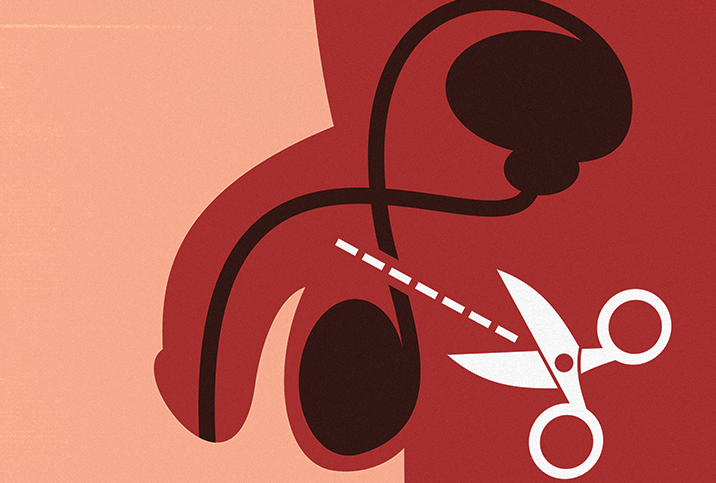Please Stop Believing These Sex Therapy Inaccuracies

About 50 million Americans suffered from mental illness in 2019, before the COVID-19 pandemic began, according to the latest data from Mental Health America, a nonprofit advocacy group in Alexandria, Virginia. Naturally, an increase in stress, worry and depression has also led to an increase in the number of people seeking treatment or therapy, according to the National Center for Health Statistics.
In 2020, 20.3 percent of adults received mental health treatment within the past year, according to the data. The pandemic also highlighted the disparities in mental health coverage compared to options available for physical health coverage, as outlined in a July 2021 study.
If there's a positive to be gained from these trends, it's that the debate on the importance of mental health coverage has become more prevalent, accompanied by a reduction in the stigma around seeking support for mental illness.
Still, that's not to say all forms of therapy are widely accepted. While few people are likely to give a second thought to why someone might seek counseling for anxiety, they might furrow their brow at the words "sex therapy," including in cases where a man or a couple seek such therapy for erectile dysfunction (ED). In combination, these words often conjure images of someone "curing" their depression or anxiety by having sex, in the same way massage therapy is a massage or aromatherapy involves aromas.
Inaccuracy #1
Sex therapy is sex
"One of the biggest misconceptions I've run across is that I have sex with my clients or that I will 'demonstrate' techniques for them or observe them engaged in a partnered sexual act or masturbation," said Rachel Bowser, M.S., LPC, a Pittsburgh-based sex therapist. "I can be mistaken for a sex worker and/or sexual surrogate."
But sex therapy doesn't involve having sex with someone to manage symptoms of depression or anxiety, Bowser emphasized.
"Sex therapy is like traditional talk therapy, except sex therapists have advanced training on a wide range of sexual health concerns," she said.
Those concerns include erectile issues.
"Sex therapists are professionals who have extra training in sex education as well as clinical sexuality," explained Erin Donnelly, Psy.D., a sex therapist with a practice in Kansas City, Missouri. "Fundamentally, we are providers who work from a sex-positive point of view and focus on the area of sexual health."
Inaccuracy #2
Sex therapy is simple and universal
Donnelly described the job as threefold. First, there's sex education, which Donnelly and Bowser both feel is severely lacking in standard education curriculums. Second, there's the sexual health component, which entails a vast knowledge of bodily functions and health issues that can impact how bodies function sexually. And third, they still have to be therapists at the end of the day, which means they need to know how to talk to people, and get people to talk to them, about a litany of issues, including depression, anxiety, performance anxiety, sexual dysfunction and more.
The job has its own set of challenges, of course. For example, the United Kingdom–based Mental Health Foundation states that although men report lower levels of life satisfaction than women and are three times more likely than women to commit suicide, they are also less likely to seek psychological therapies, including for sexual reasons such as ED.
While an individual's reasons to seek or avoid therapy vary on a case-by-case basis, men face the extra hurdle of fearing they'll appear "weak" if they seek help. It's worth noting men also avoid seeing their doctor more than women for similar reasons.
Men tend to withhold their sexual struggles more than women, meaning the combination of these three elements—seeing a doctor, specifically a therapist, and talking about sexual issues—proves a major deterrent for a lot of guys.
Of course, anyone on the gender spectrum can experience the same reservations and worries that many men face—it all depends on how you were brought up and what you know.
"I have a lot of clients who, especially with social media, in conversations with their peers or from watching movies or whatever kind of media, might feel like their sexual knowledge isn't where they want it to be," Donnelly said. "Sex therapy can be a really great safe space to learn about that and also things like how to systematically explore their bodies, have conversations with partners about sex, and engage in sex that is safe and consensual."
Inaccuracy #3
Sex therapy is cold and clinical
The male facade presents an interesting dilemma for sex therapists: How do you help someone who won't tell you what's wrong?
If you ask Bowser, the approach is all about being genuine.
"My clients get the same version of me as my family, friends, kids and colleagues," she said. "I warn new clients I don't have a poker face. They will see thoughts form on my face before they come out of my mouth. And I've been known to drop a curse word or seven in sessions."
She admitted she has a more relaxed approach than some others in the field, but she believes this helps clients feel more comfortable and open up more easily. She's willing to divulge bits about herself, as long as it's appropriate, and, in turn, her clients do the same.
Therapy in the media can often be portrayed as cold and clinical—"Tell me, was your father around much when you were growing up?"—or unprofessional, with therapists often becoming too involved, including sexually, in their clients' lives.
In reality, therapists are trained professionals seeking to help their clients work through and manage mental health issues, but they are still people with their own eccentricities.
"I think, in some ways, telehealth has helped in creating an open space," Bowser said. "Not only am I seeing into my clients' homes and getting a better understanding of their day-to-day lives, but when I work from home instead of my office, they get to see into my world as well—that I'm just a person, too…with three dogs and three cats that can, and will, create chaos during at least one session."


















